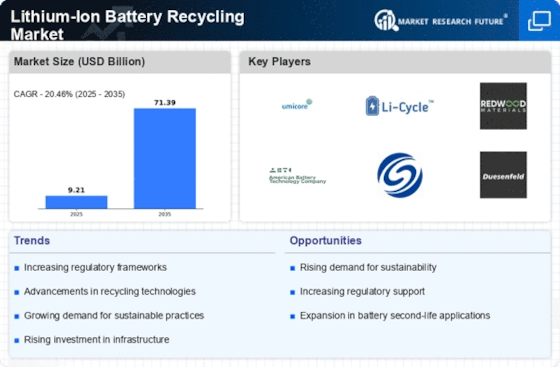Top Industry Leaders in the Li-ion battery recycling Market

*Disclaimer: List of key companies in no particular order
The market for recycling lithium-ion batteries is experiencing robust growth, driven by the increasing demand for electric vehicles (EVs) and growing concerns about environmental sustainability. As a result, there are dynamic changes in the competitive landscape, with established players solidifying their positions and new entrants seizing opportunities in emerging markets.
Key Players and Strategies: Established Players: • Umicore • Glencore International AG • RetrieV Technologies Inc. • Raw Materials Company Inc. (RMC) • International Metals Reclamation Company LLC (INMETCO) • American Manganese Inc. • Sitrasa, Li-Cycle Corp. • Neometals Ltd • Recupyl Sas
Emerging Players:
Factors for Market Share Analysis: • Recycling Technology: The choice of recycling technology significantly impacts market share, with hydrometallurgical processes considered more efficient and environmentally friendly than pyrometallurgical methods. • Processing Capacity: The ability to process large volumes of used batteries is crucial for capturing a significant market share, positioning companies with higher processing capacity at an advantage. • Geographical Presence: Establishing operations in regions with high EV adoption rates and supportive regulatory frameworks is essential for market share expansion. • Partnerships and Collaborations: Strategic collaborations with battery manufacturers, automotive companies, and other stakeholders provide valuable resources and access to new markets. • Cost and Efficiency: Companies with lower operational costs and efficient recycling processes are better equipped to compete and attract customers.
Overall Competitive Scenario: The competitive landscape is marked by intensified competition, technological advancements, an evolving regulatory landscape, a growing demand for recycled materials, and the increasing importance of strategic partnerships across the battery value chain.
Latest Developments & Updates:

